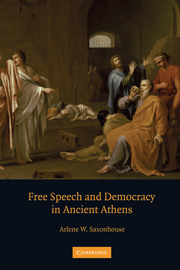1 - The Legacy of Free Speech
Published online by Cambridge University Press: 06 January 2010
Summary
Today the challenges of practicing and protecting freedom of speech seldom fade from the headlines of our newspapers or the controversies in our courts. This was not always the case. Though in the series of amendments that constitute the Bill of Rights in the U.S. Constitution freedom of speech takes pride of place as part of the First Amendment, its inclusion at that point is the result more of chance than of its perceived importance when the amendments were adopted. Over time the interest in free speech has varied greatly as have the justificatory arguments about its place in political regimes. On occasion, Athens and its democratic regime surface as part of a justificatory argument as writers connect free speech with the Athenian experience of self-rule. The more contemporary recourse to the language of freedom of speech underscores for the most part, however, the differences in the ways in which this practice becomes part of the life of a regime. The brief story of the inclusion of freedom of speech among the “first” protections in the Bill of Rights will serve as preface to a synopsis of some of the many ways that freedom of speech enters our discourse as we reflect on the goals of political life.
GOVERNMENT AS OGRE
Sitting in the first session of the U.S. Congress in 1789, Representative James Madison, one of the architects of the Constitution, acknowledged that document's inadequacies.
- Type
- Chapter
- Information
- Free Speech and Democracy in Ancient Athens , pp. 16 - 36Publisher: Cambridge University PressPrint publication year: 2005

